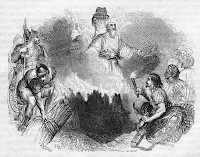I wrote once that the saints are hard corps. I used a battlefield story from the Korean War era to make my point about how the saints can motivate us to be better Christians. That is, unless they repel us and shame us with their bravery. Like today’s saint, for example.
It is the feast day of St. Benjamin. He was martyred on this day in the year 424 in a manner that brought renown to a certain Transylvanian nobleman named Vlad. But this killing of a devout Christian, for proclaiming the Gospel, happened in Persia long before Bram Stoker was around to write Dracula.
Benjamin was a deacon too. So although he was pretty involved in the affairs of his parish, he was still a little guy like you and me. A warrant officer on His Majesty’s Ships muster roll.
Here is some handy background information that I gleaned from the internet.
The Christians in Persia had enjoyed twelve years of peace during the reign of Isdegerd, son of Sapor III, when in 420 it was disturbed by the indiscreet zeal of Abdas, a Christian Bishop who burned the Temple of Fire, the great sanctuary of the Persians.
Zealots…I hate those guys! Which sounds like one of my favorite lines delivered by Harrison Ford as Indiana Jones. Usually hurled at Nazis,other bad guys, etc. As for zealots, it takes one to know one, for as Marines go, I practiced that trade with missionary-like zeal for quite some time.
So this Bishop Abdas got inspired and decided to use the scorched earth policy versus the heathen. Fighting fire with fire. Here is how it worked out.
King Isdegerd threatened to destroy all the churches of the Christians unless the Bishop would rebuild it. As Abdas refused to comply, the threat was executed; the churches were demolished, Abdas himself was put to death, and a general persecution began which lasted forty years.
Notice we aren’t marking the feast of St. Abdas? Well we will be, just not until May 16. That is the day King Isdegerd rounded him and seven others up and had them killed in the year 420. Remember the original 12 disciples? There was a zealot (or two?) among them as well. The Lord loves his zealots, as well as his fishermen and tax collectors, prostitutes, the lame, and even rich guys hiding in the Sanhedrin.
King Isdegerd died in the year 421, but his policies lived on. His son and heir named Varanes assumed the throne with the intentions of remembering his dad’s legacy, not to mention with the intent to placate the institutional anger of his pagan subjects who remembered well that their temples had been destroyed. Actually, King Varanes was going to show his departed dad how he should have handled these pesky Christians.
So here is little Deacon Benjamin, who was sitting in irons for a year, probably since he couldn’t hide from King Varanes and his stool-pidgeons forever. Good news though! An ambassador of the Emperor of Constantinople negotiates Benjamin’s release from jail. But on one condition: Benjamin must never speak of his religion again. You know, to the authorities. Just keep quiet Benjy and all will be well. Maintain a low profile. Live for another day.
Benjamin decides not to play this game. Instead he,
declared it was his duty to preach Christ and that he could not be silent. Although he had been liberated on the agreement made with the ambassador and the Persian authorities, he would not acquiesce in it, and neglected no opportunity of preaching.
Uh-oh. Another zealot. This is going to end badly.
Here is how King Varenes handles Benjamin,
He was again apprehended and brought before the king. The tyrant ordered that reeds should be thrust in between his nails and his flesh and into all the tenderest parts of his body and then withdrawn. After this torture had been repeated several times, a knotted stake was inserted into his bowels to rend and tear him. The martyr expired in the most terrible agony.
Martyrd by Varenes the Impaler.
But Benjamin’s soul lives on. Do you know the origins of the motto of the State of New Hampshire, Live Free or Die? The complete saying is taken from a toast by General John Stark, retired from the victorious Continental Army, given in 1809. It goes: Live free or die. Death is not the worst of evils.
Spoken like another zealot. I think, nay, I know St. Benjamin would agree. For as today’s reading from Isaiah (50:7-8) makes clear,
The Lord GOD is my help, therefore I am not disgraced;
I have set my face like flint,knowing that I shall not be put to shame.
He is near who upholds my right; if anyone wishes to oppose me,
let us appear together.
St. Benjamin, pray for us.























